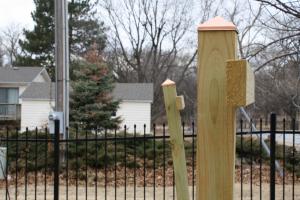
I put in raspberry trellises in our backyard. It was my last summer project that I finished this summer. I really wanted to get them straight. I dug holes and braced them. I made sure the posts were all the same height along the row. I looked down the line and saw perfection. My wife approved.
That should have been the end of the story. But it’s not. A few weeks later, I noticed that some of the posts had bent. They didn’t look straight to me. I convinced myself it must be an optical illusion, but the level confirmed what my eyes couldn’t believe: my posts had curved.
So here we are. The situation can’t be fixed. In any case, I’ve come to kind of like my convex posts. They’ve got an antiplumb character to them. And the raspberries won’t mind.
The great 4th century church father Augustine wrote that the faithful are called to believe the truth of the gospel “so that by believing they may obey God, by obeying may live well, by living well may purify their hearts, and with pure hearts may understand what they believe” (Augustine, De fide et symbolo). Augustine saw that truth ensconced short-form in the Nicene Creed, but it seems to me that his insight goes deeper than how we appropriate the Creed. In believing we obey God, in obeying we live well, in living well our hearts grow in purity so that we may understand what we believe. Belief sets us on the road to getting our hearts straightened out. God’s truth re-levels our heads.
Most of the time, this is a gradual process, something that happens in little fits and starts as the truth of God’s word dawns upon us. Sure, there are a few nonlinear epiphanic jumps along the way where our mind stutters at the edge of some moment, some statement, some experience, some relationship and we topple into something unexpectedly, manifestly true. There it is. Faith seeks understanding and finds faith.

Sometimes, our consciences need a jog from God, often delivered–whether they know it or not–through someone else. There’s that sudden focus, that snap and clear of our moral nictitating membrane, when we realize that we have gotten life very wrong at this point and then, maybe, there’s a chance to straighten things out. A vertebral pop.
William Penn, the wealthy English land-grantee who founded Pennsylvania, once asked George Fox, the founder of the pacifist Quakers, if it would be wrong to wear a sword–especially to worship. Fox told him to wear the sword “As long as thou canst.” Which, it turns out, was not much longer. Penn’s mind was re-leveled by God’s truth. His realization dawned internally, on God’s time–not by an edict from Fox.
It’s mostly worked like this for me too. I believe, and then by God’s Holy Spirit, find myself leaning into the curvature of God’s eternal truth, heart and mind leveled to his gospel.












